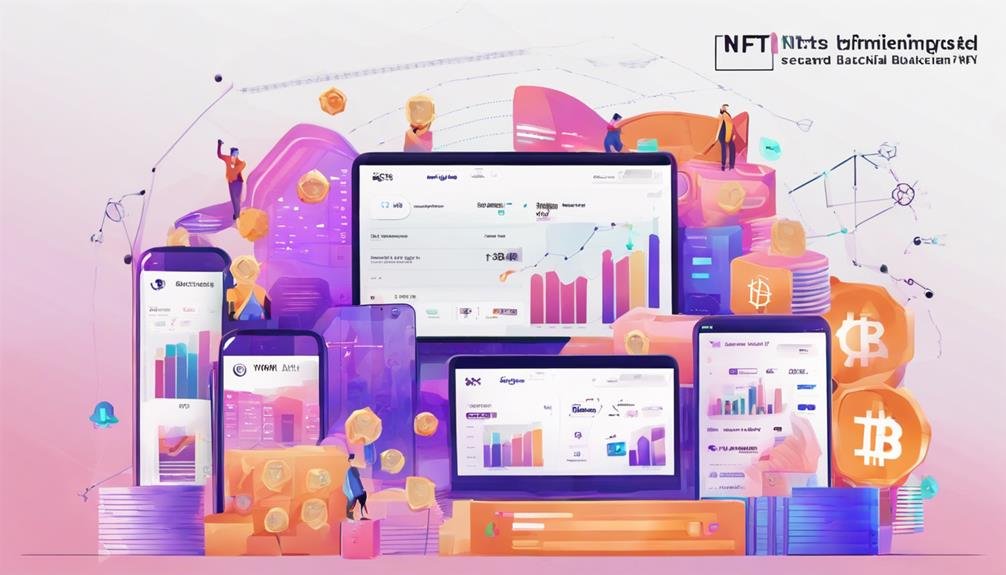NFTs revolutionize DeFi by enhancing transparency through immutable records. Smart contracts automate processes, reducing fraud risks and increasing trust. Instant processes with NFTs eliminate time delays, boosting liquidity. NFT integration expands financial services globally, promoting inclusion. Interoperability allows seamless transfer of assets, driving innovation.
NFT collateralization in loans offers security and transparency, reshaping debt management. NFT applications enhance credit scoring and insurance, mitigating risks. DeFi governance benefits from NFT participation, promoting openness and community engagement. The intricate ways NFTs transform DeFi hint at a landscape ripe for evolution and advancement.
Table of Contents
Brief Overview of 10 Impact of NFTs on Defi Ecosystem
- NFTs ensure transparent asset history and security in DeFi.
- Instant processes and liquidity enhancement through NFTs.
- NFT integration promotes global financial inclusion.
- NFT interoperability and customizability drive innovation in DeFi.
- NFT collateralization transforms loan security and debt management.
Enhanced Transparency and Immutability
Enhancing transparency and immutability, NFTs are essential in revolutionizing DeFi by providing immutable records of ownership and transactions on the blockchain. Within the DeFi landscape, integrating NFTs guarantees that every asset’s history and ownership are meticulously recorded, creating a transparent environment. This transparency is vital as it allows participants to validate the authenticity of assets and track transactions securely.
In DeFi, utilizing NFTs ensures high transparency through intelligent contracts embedded in these digital assets. These smart contracts automate processes, further enhancing the visibility of transactions. By leveraging NFTs, DeFi platforms can notably reduce the risks associated with fraud and manipulation, promoting trust among users.
Elimination of Time Delays

NFTs in DeFi revolutionize transaction speeds by enabling instant and automated processes through smart contracts. The elimination of time delays is an essential aspect of this transformation. By leveraging NFTs in DeFi projects, manual interventions are reduced, and financial activities are accelerated. The seamless integration of NFTs guarantees swift and secure asset transfers, boosting liquidity and efficiency within the ecosystem.
Smart contracts based on NFTs play a pivotal role in facilitating real-time verification and validation, significantly minimizing transaction processing times. This integration enhances the DeFi landscape and provides immediate proof of ownership, revolutionizing traditional financial sectors. Executing transactions without delays saves time and increases the overall efficiency of DeFi platforms, making them more competitive and attractive for users seeking fast and reliable financial services.
Universal Accessibility
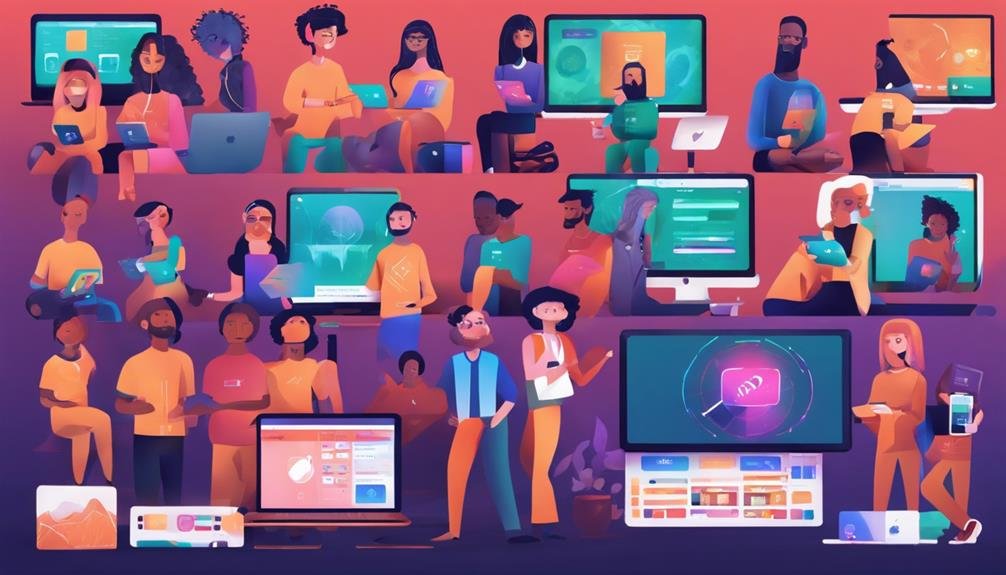
By integrating NFTs into DeFi, you expand the reach of financial services, making them available to a worldwide audience without the need for traditional intermediaries. NFTs in DeFi play a crucial role in promoting financial inclusion by enabling individuals worldwide to access decentralized finance platforms and services. Through DeFi platforms utilizing NFTs, users from different parts of the world can participate in innovative financial activities that were previously inaccessible.
These NFT-based solutions provide ownership rights and seamless transfer capabilities, further improving financial accessibility for a diverse user base. Incorporating NFTs in DeFi projects democratizes financial services, breaking down barriers and ensuring that individuals, regardless of their geographical location, can engage in the changing landscape of decentralized finance. NFTs are not only transforming DeFi but also paving the way for greater financial inclusion on a global scale.
Interoperability and Customizability
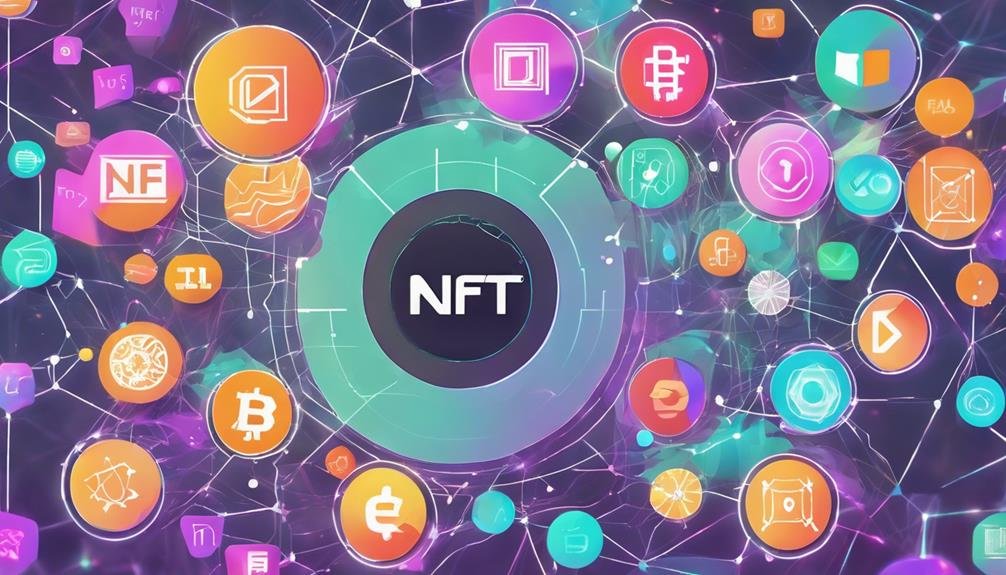
Interoperability and customizability in DeFi are vital factors that drive innovation and flexibility within decentralized finance ecosystems. The interoperability of NFTs allows for the seamless transfer and integration of digital assets across various DeFi platforms. This feature enhances liquidity and accessibility within decentralized finance ecosystems, enabling users to engage with diverse protocols efficiently.
Additionally, the customizability of NFTs through smart contracts empowers users to tailor their DeFi experiences according to their specific preferences. Customizable NFTs can represent various financial instruments and services, offering users a personalized approach to interacting with DeFi applications. By combining interoperability and customizability, NFTs are versatile tools that promote innovation and efficiency in the decentralized finance landscape. This adaptability allows for representing complex financial products and exploring new possibilities within DeFi ecosystems.
Loan Collateralization With NFTS

NFTs in loan collateralization provide lenders with a unique form of security, allowing for improved risk assessment strategies. Using NFTs as collateral, platforms like Arcade offer a secure peer-to-peer lending and borrowing environment. The transparent nature of NFT collateralization guarantees that debt agreements are managed efficiently and securely.
NFTS as Collateral
Utilizing non-fungible tokens (NFTs) as collateral in loan agreements presents a secure and innovative approach within the DeFi ecosystem. With their unique characteristics and verifiable ownership, NFTs reduce risks for lenders and offer a transparent debt management system. Platforms like Arcade facilitate peer-to-peer lending and borrowing using NFTs as collateral, ensuring a secure environment through smart contracts.
This novel use of NFT collateral showcases the intersection of blockchain technology and traditional finance. It opens up new avenues for leveraging digital assets in the DeFi landscape. By incorporating NFTs as collateral, borrowers and lenders can engage in loan transactions with increased security and efficiency, revolutionizing how financial opportunities are explored within the DeFi space.
Risk Assessment Strategies
NFT collateralization with risk assessment strategies revolutionizes loan transactions by enhancing security measures and ensuring transparent debt management within the DeFi ecosystem. When utilizing NFTs as collateral for loans, several vital benefits come into play:
- Reduced Risk: NFTs serve as unique collateral, lowering risks for lenders and providing added security.
- Enhanced Transparency: Platforms like Arcade enable peer-to-peer lending using NFT collateralization, promoting transparency in loan processes.
- Automated Processes: Smart contracts based on NFTs automate loan procedures, ensuring smooth transactions and decreasing the potential for disagreements.
Incorporating NFT collateralization with secure debt management and smart contracts opens up innovative opportunities in the DeFi landscape, merging blockchain technology with financial solutions.
Debt Management With NFTS
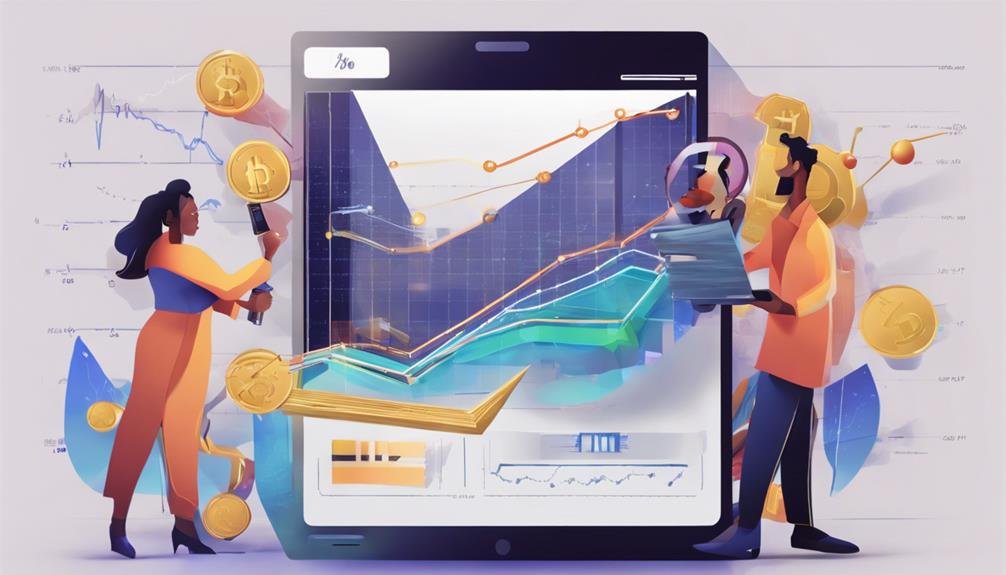
NFTs offer a new way to manage debts in DeFi, providing unique advantages for lenders and borrowers. By using NFTs as collateral, platforms like Arcade enable peer-to-peer lending securely. Additionally, integrating NFT credit scoring enhances risk assessment and guarantees efficient debt management processes.
NFTS for Collateral
By offering a unique alternative for collateral in the DeFi sector, NFTs have transformed the landscape of debt management, providing increased security for lenders and borrowers alike. NFTs can serve as collateral for loans, reducing risks and ensuring transparent processes. Platforms like Arcade enable peer-to-peer lending using NFTs as collateral, enhancing the efficiency of financial interactions. NFT-based smart contracts significantly protect both parties involved in loan transactions within the DeFi landscape.
This innovative use of NFTs for collateralization opens up new opportunities. It reinforces the security and reliability of debt management processes in decentralized finance.
Nft-Backed Loans
Utilizing unique digital assets as collateral, NFT-backed loans revolutionize debt management within the DeFi sector by enhancing security and reducing default risks. Platforms like Arcade facilitate peer-to-peer lending and borrowing through NFT collateralization, ensuring transparent and secure processes. Smart contracts associated with NFT-backed loans protect borrowers and lenders by automating transaction terms.
This innovative approach minimizes the risk of defaults and opens up new avenues for financial creativity within the DeFi landscape. By leveraging NFTs as collateral, individuals can access loans more securely and efficiently, ultimately reshaping how debt is managed and transacted within the decentralized finance space.
NFT Credit Scoring
Enhancing debt management within the DeFi sector, NFT credit scoring leverages non-fungible tokens to provide unique loan collateral. Utilizing NFT-backed assets offers a secure and transparent way to conduct transactions, benefiting borrowers and lenders. Platforms like Arcade are revolutionizing peer-to-peer lending and borrowing by incorporating NFTs as collateral, ensuring the protection of all parties involved.
NFT smart contracts further enhance the security measures in loan transactions, instilling trust and reliability. This new dimension of asset-backed lending in the DeFi space showcases the potential of NFT credit scoring to reshape how debts are managed and facilitate smoother financial interactions.
Insurance With NFTS

In insurance, NFTs are reshaping policy management by leveraging blockchain technology to guarantee transparent ownership verification. Platforms like CoverCompared utilize NFTs and DeFi to create digital insurance policies with secure ownership transfer. Through NFT-based derivative contracts, insurance providers can mitigate risks and adjust premiums dynamically based on market conditions.
One significant advantage of NFTs in insurance is eliminating policy expiration dates, offering enhanced visibility and security for policyholders. Additionally, NFT collateralization in insurance ensures the secure and transparent management of unique digital assets as collateral for policies. This innovative approach streamlines the insurance process and enhances security and trust within the industry. By incorporating NFTs into insurance practices, the landscape is evolving toward a more efficient and secure future for policyholders and providers.
Improved Visibility and Security

NFTs reshape insurance practices and greatly enhance visibility and security within the DeFi landscape by providing transparent proof of ownership for digital assets. By incorporating NFTs into DeFi protocols, you benefit from improved security measures and increased visibility into asset ownership. Here’s how NFTs enhance security in DeFi:
- Transparent Proof of Ownership: NFTs offer a clear and undeniable record of ownership for digital assets, reducing the risk of fraudulent activities and ensuring secure transactions.
- Smart Contract Security: Smart contracts used in NFT transactions automate processes and enhance security by eliminating intermediaries, reducing the potential for human error and unauthorized access.
- Unique Asset Backing: NFT-based collateralization in DeFi loans provides lenders with a secure form of asset backing, minimizing risks associated with traditional collateral assets.
With NFTs essential in enhancing visibility and security, DeFi projects are poised to revolutionize the financial landscape with innovative and secure solutions.
Governance With NFTS

NFTs play an essential role in DeFi governance by granting unique voting rights to token holders. These decentralized governance models guarantee that decisions are made by the community, promoting transparency and fairness. NFT ownership rights empower users to actively participate in protocol upgrades and changes actively, fostering democratic control over DeFi ecosystem developments.
NFTS and Voting
Utilizing NFTs for voting in DeFi projects transforms governance dynamics by empowering token holders with decision-making authority and promoting community-driven protocols. NFTs enable transparent and secure voting processes in decentralized finance, fostering active engagement within the community. Through owning NFTs representing governance tokens, participants gain direct influence over protocol upgrades and changes.
This system guarantees that decisions are made collectively and democratically, aligning with the principles of decentralization in DeFi governance. NFT-based voting systems provide verifiable proof of ownership and participation, enhancing the credibility and integrity of governance processes. DeFi projects establish a foundation for inclusive decision-making and community-driven governance structures by leveraging NFTs for voting.
- NFTs empower token holders with decision-making authority.
- NFT-based voting systems guarantee transparency and security.
- Ownership of NFTs representing governance tokens promotes community engagement.
Decentralized Governance Models
Decentralized governance models within DeFi projects, particularly those integrating NFTs, revolutionize decision-making processes by providing verifiable ownership and voting rights. NFTs act as unique identifiers, granting holders the power to participate in governing DeFi protocols. By utilizing NFT-based governance, transparency and accountability are enhanced, ensuring efficient management of decentralized systems.
Fractional ownership of governance tokens through NFTs increases community involvement, fostering a more inclusive decision-making environment. Integrating NFTs into decentralized governance structures establishes secure and auditable voting mechanisms within the DeFi landscape. This innovative approach empowers token holders and reinforces the democratic principles of decentralized finance, paving the way for a more collaborative and transparent governance framework in the digital economy.
NFT Ownership Rights
Enhancing digital asset governance and ownership rights through NFTs offers a secure and transparent framework for decentralized decision-making. NFT ownership rights in DeFi protocols enable users to govern digital assets securely on the blockchain, providing transparent ownership records for clear governance structures. NFTs empower users with voting rights and decision-making capabilities, fostering community engagement within DeFi protocols.
- NFT ownership rights empower users within DeFi protocols
- NFTs provide transparent ownership records for clear governance structures
- NFTs offer unique opportunities for community engagement and decentralized decision-making
NFT Staking
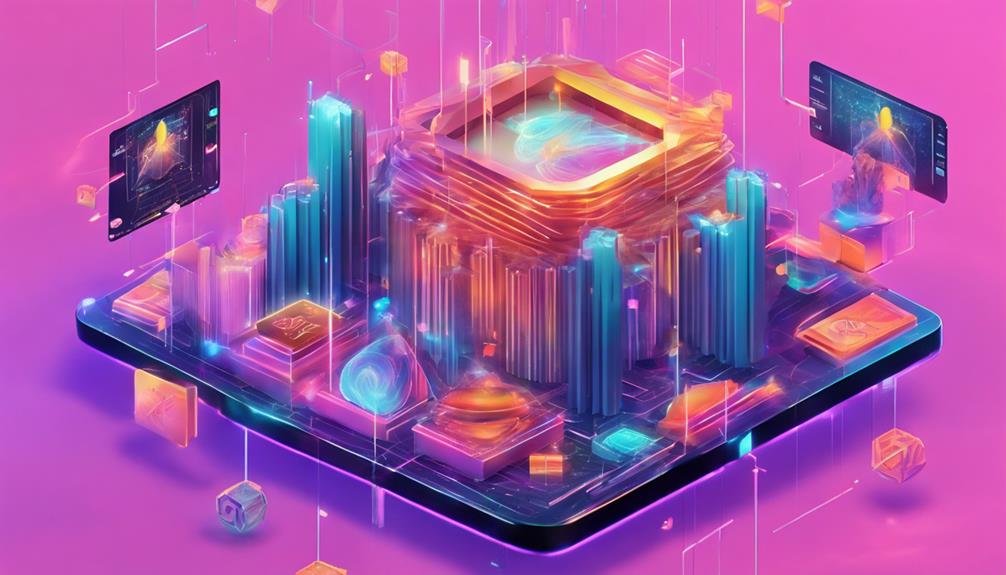
By staking your NFTs in DeFi protocols, you can earn rewards while contributing liquidity to the ecosystem. NFT staking allows token holders to lock up their NFTs in decentralized finance platforms, enabling them to generate passive income.
These staked NFTs can also serve as collateral for borrowing or lending activities within DeFi platforms, expanding their utility beyond just ownership. Additionally, participating in NFT staking can provide access to exclusive features, services, or governance rights within various DeFi projects, enhancing the overall experience for NFT holders.
Moreover, staking NFTs presents the opportunity for the value of these assets to appreciate over time, offering capital gains to participants in the DeFi landscape. This dual benefit of earning rewards and potential asset appreciation makes NFT staking an attractive option for individuals looking to maximize the utility of their NFT holdings while actively participating in the DeFi ecosystem.
Frequently Asked Questions
What Is the Use of NFT in Defi?
Incorporating NFTs into DeFi offers you unique assets for financial transactions. NFT integration enhances ownership, security, and efficiency in DeFi applications by providing proof of ownership and streamlining transactions within decentralized finance projects.
How Defi Is Changing the Financial Landscape?
DeFi changes the financial landscape by enabling direct peer-to-peer transactions, automating processes through smart contracts, and providing global market access. Tokenization benefits, smart contracts, and asset ownership enhance financial inclusivity and efficiency in DeFi platforms.
How Does the Trading Landscape for NFTS Differ From Traditional Markets?
You experience decentralized exchanges, liquidity pools, and fractional ownership in NFT trading. Here, assets are unique digital items with verifiable ownership records, enabling direct peer-to-peer transactions. No intermediaries are needed, ensuring transparency through blockchain.
What Is a Potential Use Case of NFTS in Defi Governance?
In DeFi governance, NFTs offer a unique use case by representing voting rights and ownership. They provide verifiable proof of participation, enhancing transparency and community engagement. NFTs in DeFi governance revolutionize decision-making processes on the blockchain.
Conclusion
In summary, NFTs are transforming the DeFi landscape by offering improved transparency, eliminating delays, and enabling universal accessibility. Like key revealing hidden treasures, NFTs provide a new dimension of possibilities for DeFi projects. With functionalities such as loan collateralization, insurance, and governance, NFTs are reshaping how we engage with decentralized finance, paving the way for a more efficient and secure financial ecosystem.


